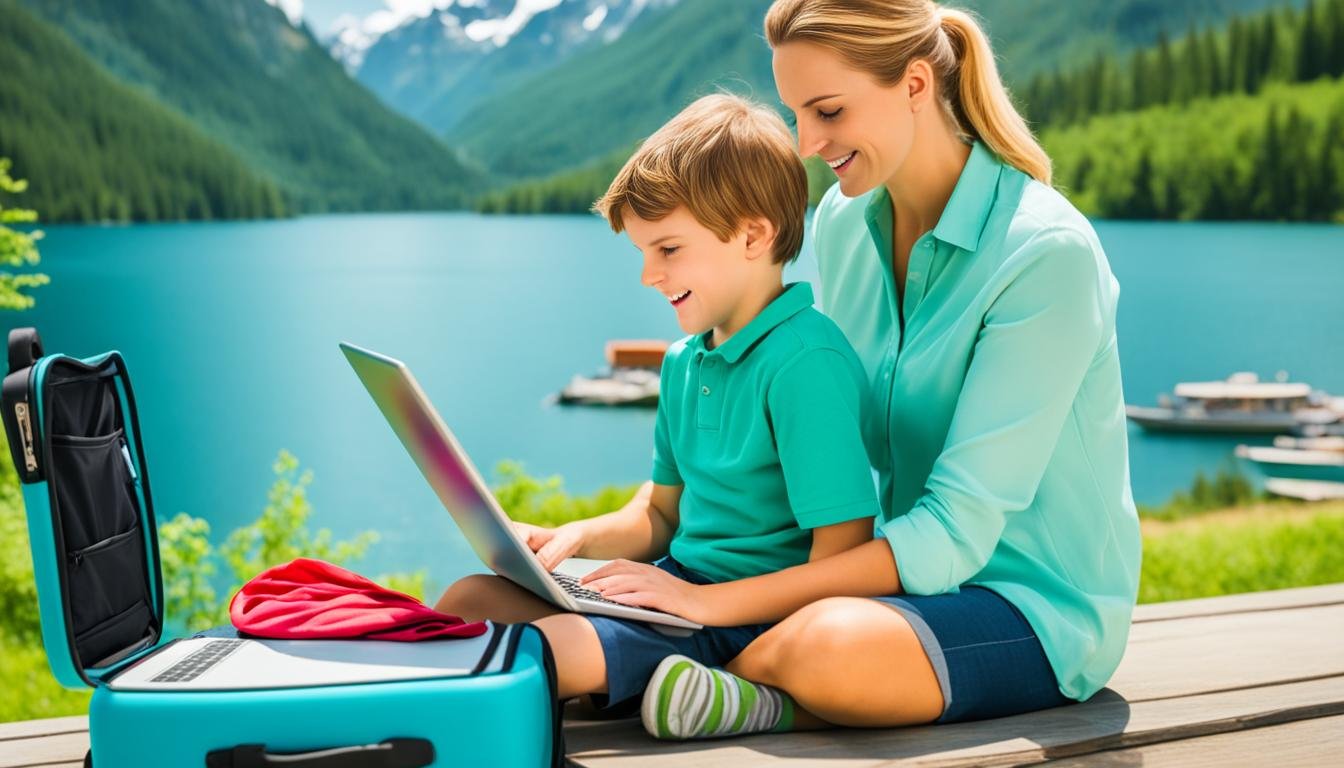Raising a Family as a Digital Nomad: Tips for Traveling with Kids
Choosing the digital nomad lifestyle is thrilling for families too, not just solo travelers. It’s great for those with young or teenage kids. Thanks to remote work, you can make your dream of family adventures come true. This way, you redefine what it means to be a parent while traveling.
Traveling with kids can make you feel less lonely, unlike solo trips. You’ll share new experiences and learn about different cultures together. This can make memories that last a lifetime and bring your family closer.
You don’t have to hop from country to country non-stop. Longer stays in one place can be easier for everyone. By living in local communities, families can enjoy the digital nomad life without the stress of moving too much.
Before becoming nomads, families should think about their work and the challenges they might face. They should look at the good parts like flexibility and seeing new places. Also, they need to think about legal stuff like taxes and visas. A good plan can make family travel a great and lasting choice.
Key Takeaways
- Embrace shared adventures to strengthen family bonds.
- Avoid constant moving; opt for longer stays in one location.
- Plan meticulously to manage work, school, and travel commitments.
- Ensure you understand legal and financial implications.
- Utilize local resources for children’s education and healthcare.
The Digital Nomad Family Lifestyle: An Introduction
Remote work is becoming more common, making it easier for families to travel the world. This lifestyle of digital nomadism combines work and education in a new way. It lets families grow and explore together.
The Schomp family has visited every continent and over 60 countries since 2016. Michelle and Jake Schomp, along with their toddlers Henley and Jagger, share their travels online as “Retired Toddlers.” They show the joy of spending time together as a family on the move.
The Komer family started their ‘work from anywhere’ life in 2022, moving every 2-3 months. They balance their digital nomad dreams with great family travel tips. This lifestyle is full of exploration and growth.
The Magon family takes a slow approach, spending three months in each place. This lets them really get to know the local culture. It also gives their kids a sense of stability while traveling.
The Hennigan family moved to Spain, Portugal, France, and Italy for health reasons. Their life on the move enriches their family life. It gives their kids a diverse education and strengthens family bonds.
The Schomp family talks about the challenges of traveling with young kids, like potty training. They adjust their travel plans to meet their kids’ needs. They’ve met many other traveling families, building a strong community.
These travels create lasting memories for the kids. For example, Henley, just 4 years old, remembers past trips vividly. These experiences broaden their view of the world.
Living the digital nomad family life needs good planning and flexibility. But, seeing your kids grow and explore the world is incredibly rewarding.
Benefits of Raising a Family as a Digital Nomad
Living as a digital nomad brings many perks for families. It’s a world where flexibility and freedom, meeting new cultures, and spending quality time together are key. Parents can work remotely and still be there for their kids.
Flexibility and Freedom
Being a digital nomad means having a lot of flexibility and freedom. Families can pick where they live based on the weather, cost of living, or cultural events. This lifestyle lets parents set their work hours to fit their kids’ needs, making life more balanced.
Many digital nomads work as bloggers, developers, or virtual assistants. This gives them the chance to plan family time without missing work. But, planning is key when traveling with kids.
Exposure to New Cultures
Living in different countries is a big plus of the digital nomad life. Kids and parents learn new languages, traditions, and ways of thinking. This helps kids grow up open-minded and adaptable.
Jay and his family lived in Bangalore for a year and Morocco for four months. These experiences broadened their understanding of the world. It’s great for kids to learn about different cultures early on.
Strengthening Family Bonds
The digital nomad life helps families grow closer. Traveling together leads to unforgettable moments, building unity and teamwork. Families learn to rely on each other in new places, creating strong bonds.
Even with the challenges of being a digital nomad, having a supportive family helps. It also teaches kids about self-discipline and being adaptable. These are important for growing up and moving forward together.
Challenges You Might Face on the Road
Starting a nomadic life with your family means you’ll face both adventures and challenges. Knowing about these challenges is key to doing well on the road.
Loneliness and Isolation
Loneliness is a big challenge for nomads. Even with more families traveling together, the constant moving can make people feel alone. It’s important to build a strong social network to fight loneliness.
Joining community activities, using social media to meet other nomadic families, and finding co-working spaces and clubs can help. These steps can make feeling isolated less common.
Financial Instability
Money issues are another big challenge. The changing nature of remote work can make budgeting hard. Some digital nomads find living costs lower in places like Latin America than in the U.S.
But, it’s important to have different ways to make money. Parents with kids need a solid financial plan. Saving money in an emergency fund and using financial apps can help during tough times.
Health and Safety Concerns
Keeping your family safe and healthy while traveling is very important. Parents should teach their kids about dangers in new places. Having a good healthcare plan for traveling is key.
Also, knowing the health and safety rules of each place you visit is important. Using online doctor visits and keeping up with health supplies can help avoid health problems on the road.
Effective Planning and Organization for Nomad Families
Planning and organizing are key for a great nomadic life. Making a detailed family plan and sticking to a budget can make traveling better for digital nomads. Let’s look at how to plan well and manage money.
Creating an Itinerary
It’s important to make a family plan that everyone likes. Start by thinking about where you want to go and what you want to do. Since many families like to stay in one spot for a while, plan to stay in each place for three months.
This lets you really get to know the culture and gives kids a stable routine. It makes them feel safe and secure.
- Flexibility: Add some room in your plan for surprises or new adventures.
- Balance: Make sure you have time for work and fun to have a good trip.
- Resources: Use apps like Andromoney to keep track of your spending and stay on budget.
Setting a Budget
It’s crucial to budget well to avoid overspending. Here are some tips to help you stick to your travel budget:
- Save money on housing by using a motorhome for your trips.
- Focus on finding affordable food and health insurance.
- Try to find free places to stay to save on accommodation costs.
- Set a weekly or monthly budget that includes all your expenses, including emergencies and health insurance.
Use rental income, savings, and your own jobs to fund your travels. Keep an eye on your spending and adjust your budget as needed. This way, you can enjoy your nomadic life without going broke.
“Travel isn’t always about luxury. Effective planning and managing expenses wisely can make the experience enriching for the entire family,” emphasizes seasoned travelers.
Choosing the Right Accommodation
Picking the right digital nomad accommodation is key for comfort and practicality for families. The Digital Nomad Report 2023 shows 17.5% of digital nomads travel with their families. This trend shows how important it is to find living spaces that meet everyone’s needs.
When looking for nomad housing, families should think about a few things.
- Location: Being close to healthcare, grocery stores, and schools is crucial.
- Community: Joining local groups and activities helps kids feel at home. Online communities for digital nomad families offer great support and advice.
- Amenities: Make sure the place has good internet, safety features, a work area, and places for kids to play.
Digital nomads look for places that are affordable but still comfortable. The author plans to spend less than $3000 USD a month on a place to stay in America. Using Airbnb, VRBO, and Priceline can help find places that are both affordable and good for families.
Using family travel tips can make finding a place to stay easier. Booking 4-6 weeks ahead lets you be spontaneous and still get a spot during busy times. Also, it’s important to balance kids’ screen time. Places with outdoor areas or near parks are great for kids to be active and meet people.
The secret to great digital nomad accommodation is finding a balance. With careful planning and using travel tips, families can have amazing experiences on the road. This way, everyone’s needs are met.
Education Options for Traveling Kids
For digital nomad families, finding a good education on the move is key. There are many flexible and mobile education options for traveling kids.
Homeschooling and Online Learning
Homeschooling and online learning are big hits with digital nomad families. Homeschooling lets parents adjust the curriculum to fit their kids. It keeps education steady for kids who move a lot.
Online learning sites offer structured lessons and recognized diplomas. This means kids can learn from anywhere in the world.
International Schools
Staying in one place for a while makes international schools a good choice. These schools give kids a regular school experience. They help with making friends and staying on track academically.
It’s important for parents to check if these schools are reputable. This ensures the education fits with their kids’ future goals.
Worldschooling Adventures
Worldschooling uses travel to teach kids. It mixes local culture, history, and practical skills into learning. This makes learning fun and connected to real life.
Even though it’s different from traditional school, it gives kids valuable experiences. These experiences help them understand the world better.
Digital nomad families have many education choices. They can pick the best one for their lifestyle. This way, kids get a full and meaningful education while traveling.
Managing Work-Life Balance While Traveling
Many traveling parents aim for a good work-life balance, especially in the growing digital nomad community. With about thirty-five million digital nomads worldwide, it’s key to keep work and family life separate.
Working remotely in new places means setting clear boundaries. Using time management helps digital nomad parents work well and be there for their families. They should spend about 70% of their time on focused work and 30% on meetings or team tasks. Having a daily routine is also key.
For traveling parents, technology is a must. A fast internet connection of at least 10Mbps is crucial for staying in touch and working efficiently. Tools like noise-canceling headphones and portable desks make working away from home easier.
Having a support network is also vital. Options like local childcare or shared spaces in co-working areas help digital nomad parents balance work and family life. These setups let parents focus on their jobs while their kids are well cared for.
Building a supportive community is just as important. Online groups for digital nomad families are growing. They share tips, resources, and support, helping keep a good work-life balance.
Lastly, digital nomad families find flexible schooling options helpful. Online learning lets kids learn at their pace and adjust to new places easily. This approach builds resilience, problem-solving skills, and broadens their view of the world.
Managing work and life while traveling is tough, but with the right strategies, support, and tech, digital nomad families can do well. This lifestyle offers many benefits, leading to memorable experiences and strong family ties.
Legal and Financial Considerations
Planning your nomadic lifestyle means looking at legal considerations and financial stuff. It’s important whether you’re going solo or with your family. Knowing what you need to do is key.
Obtaining the Right Visas
Getting the right digital nomad visas depends on where you’re going. Each place has its own rules for remote workers. Countries like Estonia, Barbados, and Croatia offer special visas for digital nomads, letting you stay from six months to a year or more.
It’s crucial to do your homework on these visas. This way, you can avoid legal issues that could mess up your plans.
Understanding Tax Implications
Handling tax responsibilities as a digital nomad can be tricky. You might face double taxation if you work in different countries. For example, U.S. citizens need to know about the Foreign Earned Income Exclusion and IRS rules.
Talking to a tax expert who knows international tax laws is a good idea. They can help you manage and reduce your tax duties.
Ensuring Kid-Friendly Travel Experiences
Traveling with kids can be an adventure full of fun and memorable moments. To make the trip smooth and enjoyable, being prepared and adaptable is key. Make sure everything about the trip is designed for kids.
Packing Essentials for Kids
Packing for kids means thinking ahead and being thorough. Include comfort items like a favorite toy, blanket, or book to make them feel secure. Also, pack wet wipes, first-aid kits, and snacks they like.
Don’t forget entertainment options such as cuddly toys and card games. These keep your kids happy and engaged during the trip.
Kid-Friendly Activities
Plan activities that are fun for kids of all ages. This could be visiting a zoo, a theme park, or a nature trail. Choose activities that are both fun and educational.
Be ready to change plans if the kids get tired or moody. Having flexibility helps make the trip enjoyable for everyone.
Maintaining Health and Safety on the Road
For digital nomad families, keeping healthy and safe is key when traveling. It’s important to have travel medical insurance for access to quality English-speaking doctors. This insurance can be a big help, especially in remote areas with limited medical care.
Knowing about local risks, like traffic accidents or natural disasters, is also key. Families should check travel advisories often. These advisories tell you if it’s safe to travel to a country, with levels from “Exercise Normal Precautions” to “Do Not Travel.” Keeping up with advisories helps make smart choices about where to go, ensuring safe family travel.
Being prepared is crucial for digital nomad healthcare. Always find out about the nearest hospitals and bring needed medicines. Teach kids about emergency plans so they know what to do in an emergency. Over the last 4.5 years, families traveling to places like Spain and Portugal have shown that with good planning, healthcare needs are easily met.
Finding safe and family-friendly places to stay is also important. Sites like TripAdvisor and Oyster offer reviews and ratings for hotels. Oyster checks hotels itself, giving you trust in your choice. Choosing to travel during quieter times can also make things safer and cheaper, as reports suggest.
Finally, a full plan for health and safety on the road makes life as a digital nomad family stable. It lets them enjoy their adventures while staying safe and healthy.
Raising a Family as a Digital Nomad: Tips for Traveling with Kids
More families are now living the digital nomad life. They mix work and travel with their kids. This lifestyle lets them control their work and family time. It also gives their kids a chance to see different cultures. But, it comes with challenges like adjusting to always being on the move and dealing with changing income.
- Plan ahead: Making a checklist is key. Pack light and think about what you’ll need for work on the go. Always keep important documents ready.
- Education options: Homeschooling is a top choice for digital nomad families because it’s flexible. Online schooling works too, but you need reliable internet.
- Health and safety: Getting international health insurance is a smart move. It ensures you can get medical care while traveling. Health issues can affect your nomad life, so plan ahead.
- Social connections: Keeping kids connected is important. Use apps and meet other nomadic kids to help them feel part of a community.
Living the digital nomad life means making plans and making choices. It takes months or even years to get ready. Families use itineraries, budgeting, and pick affordable places to live. The good parts include seeing new cultures and flexible schedules. But, you need to be organized to deal with the downsides like feeling lonely or handling taxes.
Conclusion
Embracing digital nomadism is a great way for families to grow and travel together. It lets them see new cultures and get closer. This lifestyle is flexible and free, but it needs careful planning.
Planning is important for legal, financial, health, and educational needs. Making a detailed plan helps ensure a successful and lasting nomadic adventure.
Studies from the University of Melbourne and the University of Southern California show travel benefits kids’ brains. They learn more from different cultures and environments. But, deciding to be digital nomads with kids means looking at all the effects, including emotional, financial, and practical ones.
More families are choosing this lifestyle, inspired by stories like the Australians who traveled the world. It’s a fulfilling path for those ready for the challenges. Being flexible and focused on everyone’s needs makes it rewarding.
Embracing digital nomadism is a journey full of adventure and valuable lessons. It’s a way to grow personally and as a family.
Source Links
- Being a Digital Nomad Family – Traveling With My 4 Kids
- How to Keep Everyone Happy in a Real Digital Nomad Family
- How to work and travel with children – Digital Nomad Family with Kids – Travel Blog
- Digital Nomad Families: What it’s like to be a digital nomad and travel the world with kids
- Digital Nomad Life: Traveling With Kids: Jake And Michelle Schomp, Parents Of The “Retired Toddlers”
- How to Become a Digital Nomad Family
- How to become a digital nomad family: your ultimate guide – TraveLynn Family
- How to Live Nomad Lifestyle with Children
- EPIC Guide to Full-Time Family Travel (2024)
- The Good, the Bad, and the Ugly of Living as a Digital Nomad in 2022
- Why Are More Families Embracing Digital Nomadism With Kids?
- Being a Digital Nomad Family – Raising Kids on the Road
- Parenting whilst nomads
- Digital Nomad with a Baby – What to Expect
- How to Onboard Your Kids with Your Digital Nomad Lifestyle”
- Long Term Travel with Kids: How Do We Do It?
- Schooling options for Nomadic family lifestyle
- Digital Nomad Families: The Education Aspect | The Blogler
- Digital Nomad Parenting
- How we Balance Work, Family and Travel
- Being a Digital Nomad Family – Of Sharks and Turtles
- The Rise of Digital Nomad Families – NerdWallet
- Being a digital nomad isn’t just for singles. Here’s how families make it work
- Parenting and Travel (Raising Kids on the Road) –
- Practical Tips for Travel With a Toddler
- Ultimate Guide to Safe and Healthy Family Travel | WorldTrips Travel Insurance
- Being a Digital Nomad Family – Sailing across the World
- Becoming a Digital Nomad Family
- Becoming a Digital Nomad Family | The Blogler
- Digital Nomads’ Views towards Marriage and Having Children
- Digital Nomads And Children: The Absolute Truth | Nomad Talk
- Are Digital Nomad Parents Robbing Kids of a ‘Real’ Childhood?







